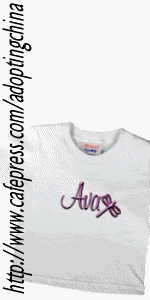 I received a response from Solangel Moldonado today. Here is her response and how I responded back to her.
I received a response from Solangel Moldonado today. Here is her response and how I responded back to her.----- Original Message -----
From: Solangel Maldonado
To: saramlane@earthlink.net
Sent: 1/7/2007 11:32:38 AM
Subject: Re: China adoptions discussion on CNN
Dear Ms. Lane,
Thank you for your comments and for the opportunity to respond. First, I regret if my comments were offensive or hurtful in any way. My goal in appearing on the show and in researching and writing on this topic is to debunk the many myths about domestic and international adoption and to start a discourse about an incredibly important issue. Unfortunately, the format of the program does not allow panelists to explain our position in any depth or to provide evidence supporting our assertions. Thus, I would like to take this opportunity to do so.
I do not believe that most families who adopt internationally are motivated primarily by race. There are many complex reasons why Americans choose to adopt internationally, and from China in particular. In my article, Discouraging Racial Preferences in Adotions, I address many of these reasons. For example, I explain that some Americans chose to adopt internationally because:
--they believe there are relatively few infants available for adoption in the U.S.
--they believe that domestic adoptions take too long and are more expensive than international adoptions
--they prefer a closed adoption as opposed to an open adoption
--they are afraid that the adoption will be disrupted, that the birth mother or father will reclaim the child.
--they believe that many of the children available in the U.S. have significant special needs (for example, that the birth mother consumed drugs or alcohol while pregnant)
--as a result of the United States' history of race matching policies and the National Association of Black Social Workers™ opposition to transracial adoptions of African-American children, some white families may not be aware that they can adopt African-American children. They also might not know anyone who has.
--some adoptive parents feel that given the One Child Policy in China, they can give a female child an opportunity that she otherwise could never have.
I discuss all of these reasons in my article and then I show that many of these beliefs about adoption are based on misinformation. For example, although it can take a very long time to adopt a white infant in the U.S. and such adoptions can be expensive, that is not the case with adoptions of African-American children. Adoptions of African-American children are actually less expensive than international adoptions. The reason is that agencies must subsidize adoptions of African-American children because there aren't enough families seeking to adopt them. For example, American Adoptions (the largest domestic adoption agency in the U.S.), like many agencies, has a separate, subsidized program for adoptions of African American or Bi/Multi-Racial newborns and infants. Any race combined with African American.
This agency explains why the fees to adopt African-American or biracial children is lower than the standard fee--the fee charged for "adoption of Caucasian, Hispanic, Asian, Native American, etc newborns and infants." It states that: "Costs are lower in our Agency Assisted Program because American Adoptions subsidizes the advertising for this program. There is a shortage of families for African American babies in the adoption community so costs must be lowered so it is possible for these babies to find wonderful homes."
Further, the average wait time for an African-American child, according to this agency, is "1-9 months" and they explain that the "The reason the waiting time is substantially shorter is because there are less families in this program."
I interviewed numerous adoption agencies as I conducted my research. (The agencies names, contact person, and the date of the interview are provided in my article which I have attached as a link to this email). These agencies all informed me that there is a shortage of families seeking to adopt healthy African-American infants. As a result they had to reduce the fees for adoptions of African-American or biracial children 25% to 50%. They also informed me that the wait for an African-American child was less than a year and, in some cases, as short as two weeks after completing the home study. In contrast, the wait time for an adoption from China is approximately 15 months. Many foreigners, primarily Canadians, come to the U.S. each year to adopt African-American infants precisely because such adoptions are relatively fast, affordable, and the majority of the children are healthy. Approximately 500 African-American infants are adopted internationally each year.
In my article, I explain that I am not talking about African-American children in the foster care system. Adoptions from the foster care system can take a long time and for some prospective adoptive parents, the risk that the court will not terminate the birth parents rights or will place the child with a family member instead is unacceptably high. Thus, my focus and comparison is not between adoptions of children in foster care in the U.S. and international adoptions. Rather, I am comparing adoptions of African-American children placed voluntarily through private agencies with international adoptions. When we look at adoptions of African-American and biracial children whose birth parents placed them voluntarily, we see that there is no shortage of such infants. Rather, there is a shortage of adoptive families seeking to adopt these children.
Unfortunately, while conducting my research I learned that race plays a role (consciously and unconsciously) in some Americans decisions to adopt internationally. Although scholars such as Elizabeth Bartholet and Randall Kennedy at Harvard Law School, Twila Perry at Rutgers Law School, and Patricia Williams at Columbia Law School have been writing about the role of race in adoption for years, I was appalled to learn that in 2005 and 2006, agencies were still finding that some families were choosing to adopt internationally because they did not want to adopt the children who were available in the U.S. African-American children. Some prospective adoptive parents did not believe that they could competently raise an African-American child with a healthy racial identity, while others were concerned that their family members and neighbors would not accept an African-American child into the family even though they would accept a child from China, Korea, or Guatemala. Others feared that, if they adopted an African-American child, people would assume that their child was a "crack baby" (as ridiculous as that sounds). Interestingly, some Americans who adopted children from Korea or China found that some people automatically assumed that their child must be "smart" or a "model minority" because of his or her biological roots.
I have tremendous respect for adoptive parents. I only wish (as I am sure you do) that race was never a consideration in any adoption decision. Unfortunately, it sometimes is. Some of you may have seen the article in yesterday's New York Times discussing the sharp decline (18%) in adoptions from China in 2006. The number of international adoptions by Americans from South Korea, Russia and Ukraine also dropped significantly last year. Given this trend, I think we might see more Americans adopting African-American children.
I am attaching a link to the NY Times article.
I am also attaching a link to my article with footnotes documenting my research. That link is here I regret that I did not have the opportunity to make these points on the show.
Respectfully,
Solangel Maldonado
My response back:
While I do feel your comments on the panel were not as offensive as the others, I do feel compelled to let you know that my husband and I have looked into African-American infant adoption in the US. Yes the fees for these children are reduced. And yes the babies available outnumber the families willing to adopt them. That is probably why there are more black children in the foster care system. The problem I still face with ANY American adoption is the fact that you could spend hundreds and thousands of dollars hoping that this one mother will give you her baby when she has it and then she can LEGALLY change her mind after the baby is born and you are out your money. And you are left with empty arms and a broken heart. It just isn't worth the emotional turmoil when you have already been through so much heartbreak through years of infertility treatments that didn't work. For some of us it feels like we will never become parents. It is easier for us to take our ticket in line with China and know we will have a child at the end of everything. I would rather put my $20,000 on China than an American adoption any day. Because with the American adoption you are just taking your chances, emotionally and financially.
You list of reasons people adopt from China is not truly accurate. 1) I don't believe there are too few infants available in the US. I believe the US makes it too difficult to adopt the ones that are available, no matter what their race. And I believe the US gives birthmothers too many rights when it comes to receiving gifts, money, etc from prospective adoptive parents. 2) You said they believe US adoptions take too long and are more expensive than international adoptions. I don't believe that. Our China adoption will probably have taken a little over 2 years to complete when we get our child and we will have paid more than if we had a dopted an African American infant from the US. 3) There are just as many special needs children available from China. You are going to find these anywhere. Some people (not myself) feel that if they are going to spend $20,000 for a child, they would prefer it to be healthy. 4) When we first started thinking about adoption some agencies were hesitant to even let a white couple consider a black child. Some birthmothers still do not want their black child placed with a white family. Now that their is becoming a surplus of black babies in the US, these thoughts are changing but you do still find them. 5) The one-child policy in China is a very sad situation and your heart can't help but ache for these children (girls AND boys) who are given up only because their family already had their one child. The laws in China are becoming more lax regarding this policy. But with the heavy taxing of families with more than one child, most families cannot afford more than one child. Please remember there are also boys available from China. I have two good friends right now who have specifically requested boys from China.
I agree there are a lot of people who still see lines drawn between black and white in this country. I belong to several yahoo groups on inter-race adoptions. There is one yahoo group just for caucasian parents who have adopted black children to understand hair and skin issues. I think today it takes a strong couple to raise any child of a different race than their own. People are always going to look at you funny, no matter what race your child is. That is just how it is. But I think that the reasons people adopt from China are far more than just the color of skin.
Thank you for taking the time to respond to my comments. I am sure you have gotten many emails. I am sorry that you did not get to express your full view on this situation during this panel discussion.
Sara























 Do not be afraid for I am with you. I will bring your children from the East and gather you from the West." ~God (Isaiah 43:5)
Do not be afraid for I am with you. I will bring your children from the East and gather you from the West." ~God (Isaiah 43:5)
3 comments:
Good for you! My feelings are unless you have adopted or are adopting, people can't understand how we feel.
Excellent response.
I appreciate you breaking all of this out and I agree with your comments.
I am also glad that you took the time to approach this woman. You have dealt first-hand with the failures in the US adoption system. You are fully entitled to speak about what is COMPLETELY broken.
I am floored that I am considered a racist while in the process of adopting a child of another race.
I love your blog.
You have a lot of spirit.
I'm surprised she actually wrote to you.
Post a Comment